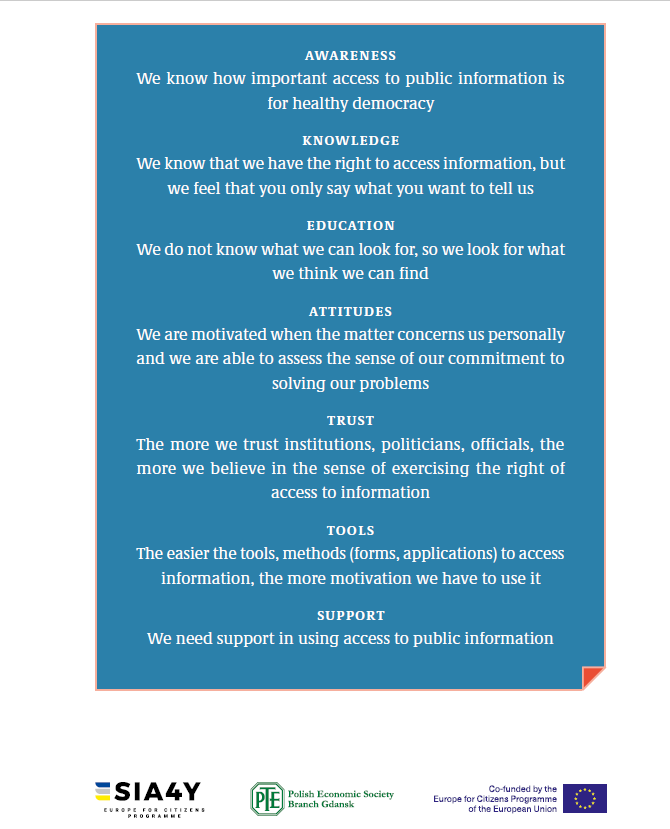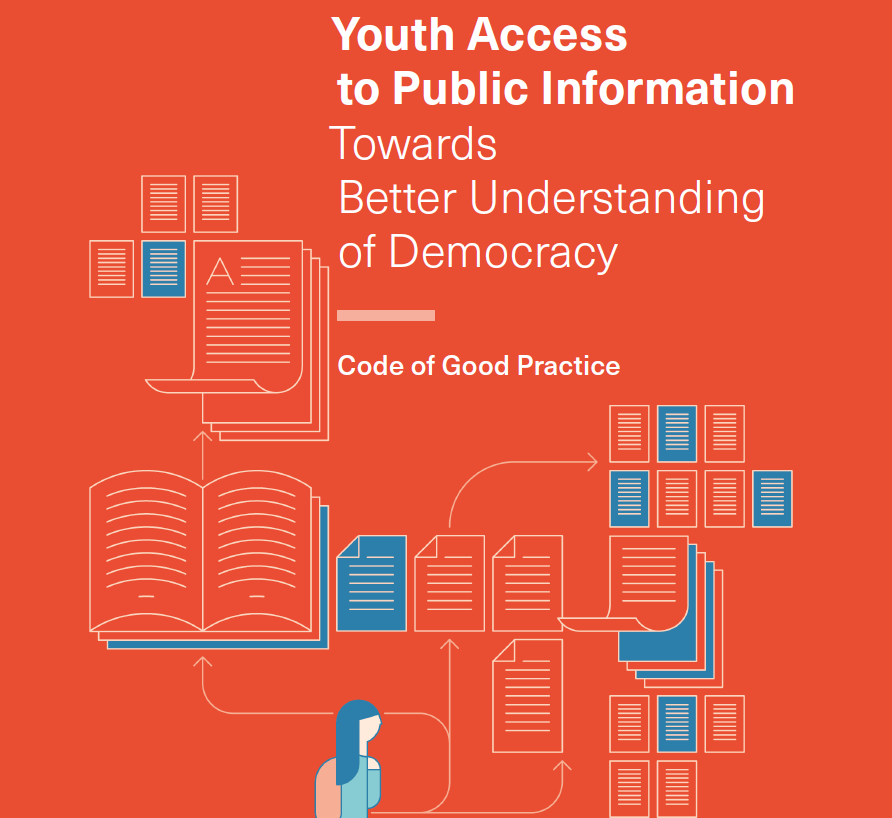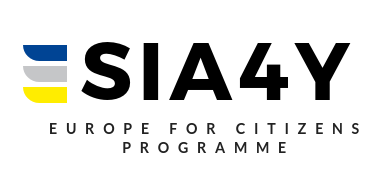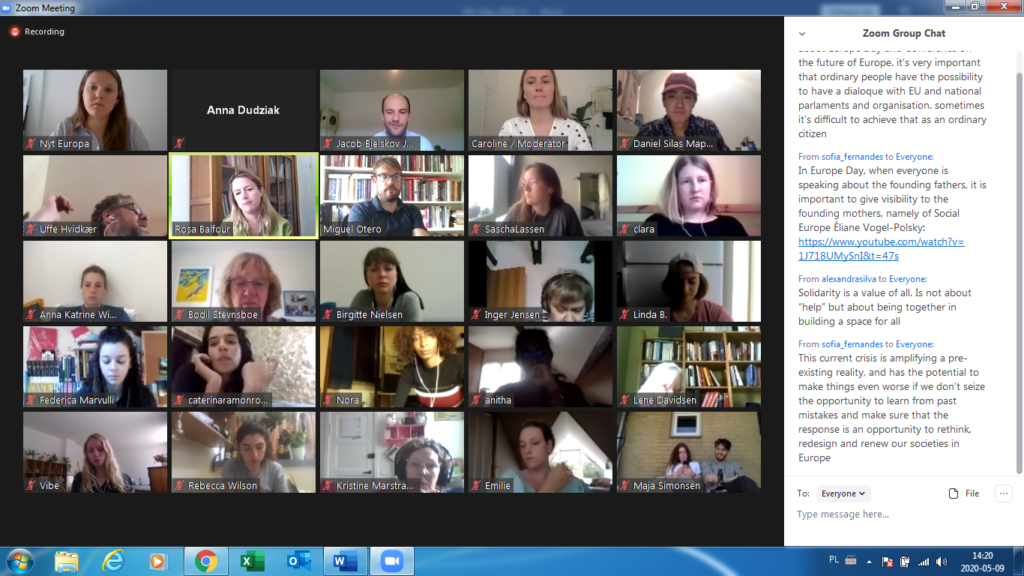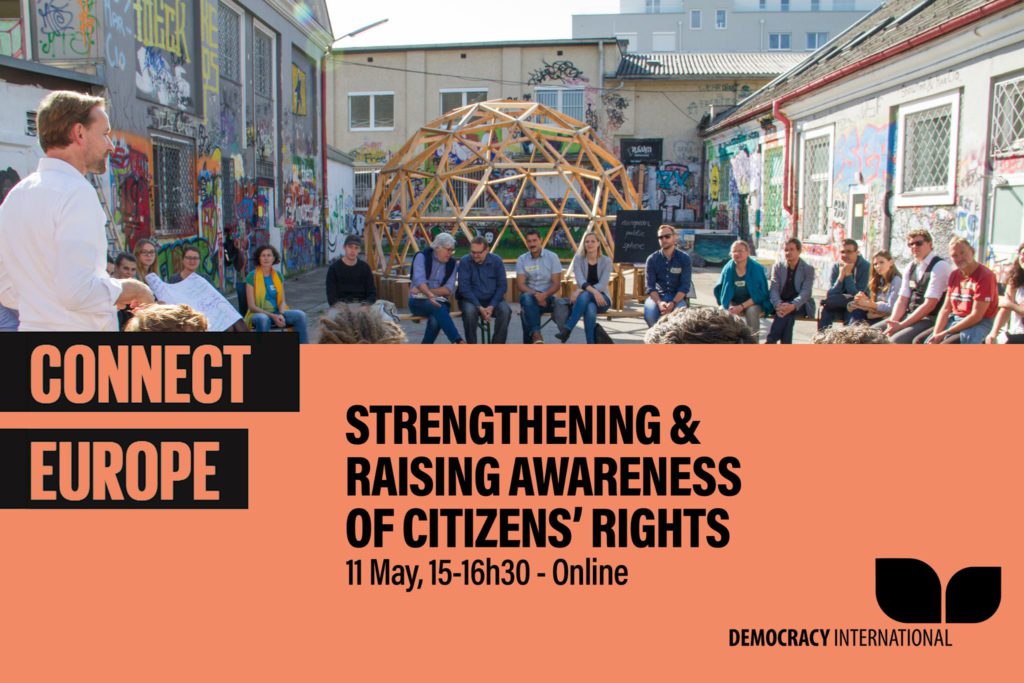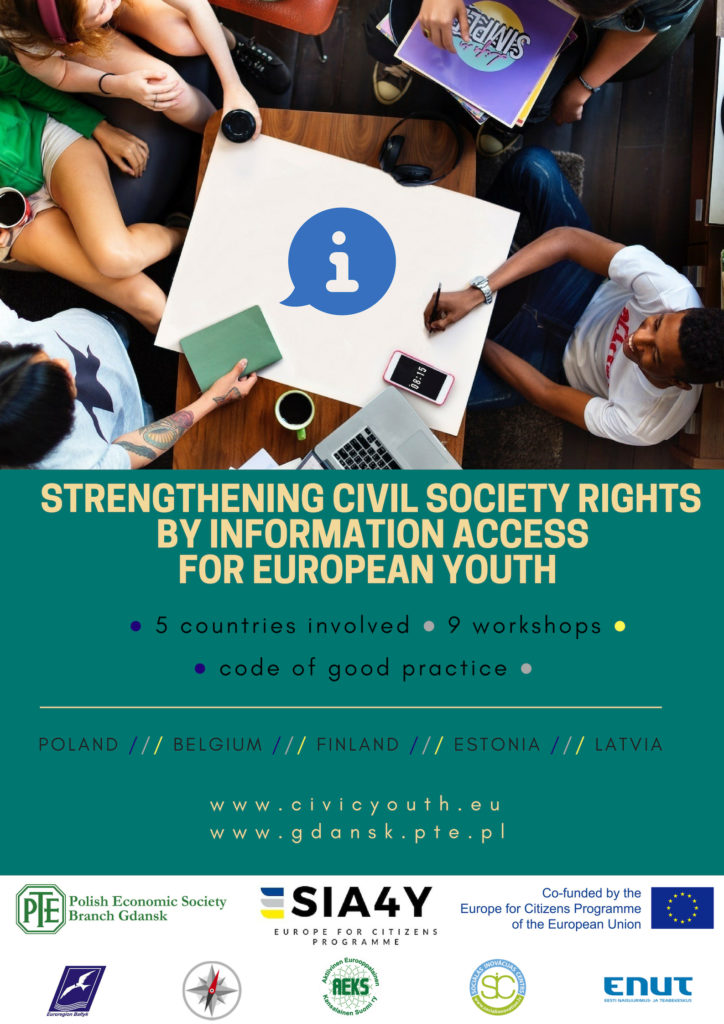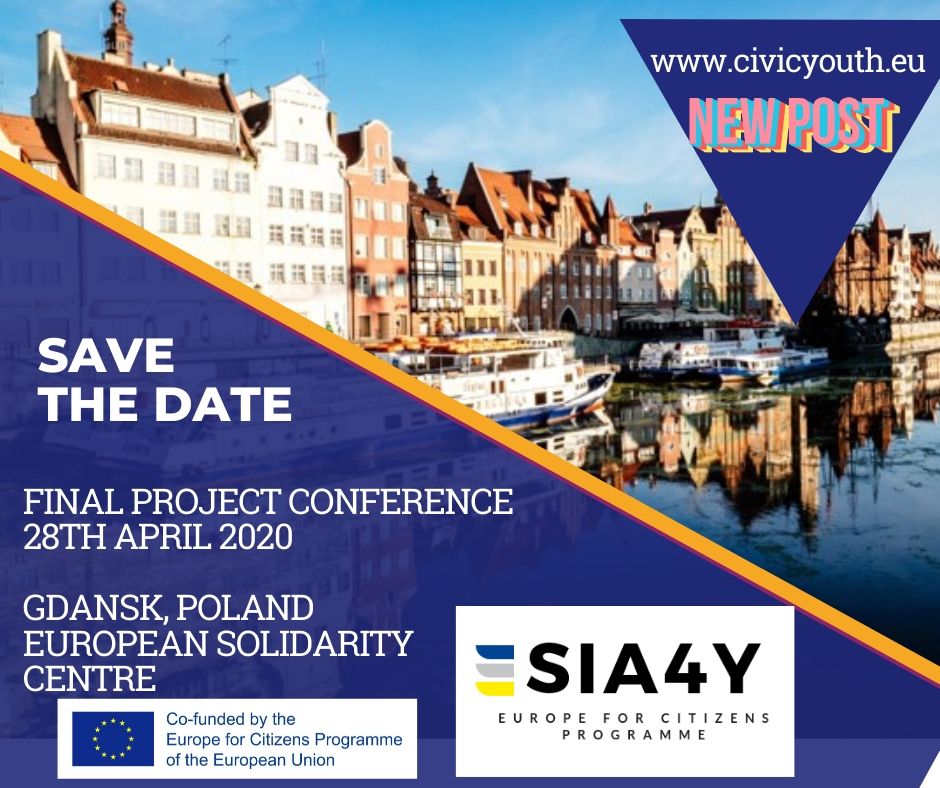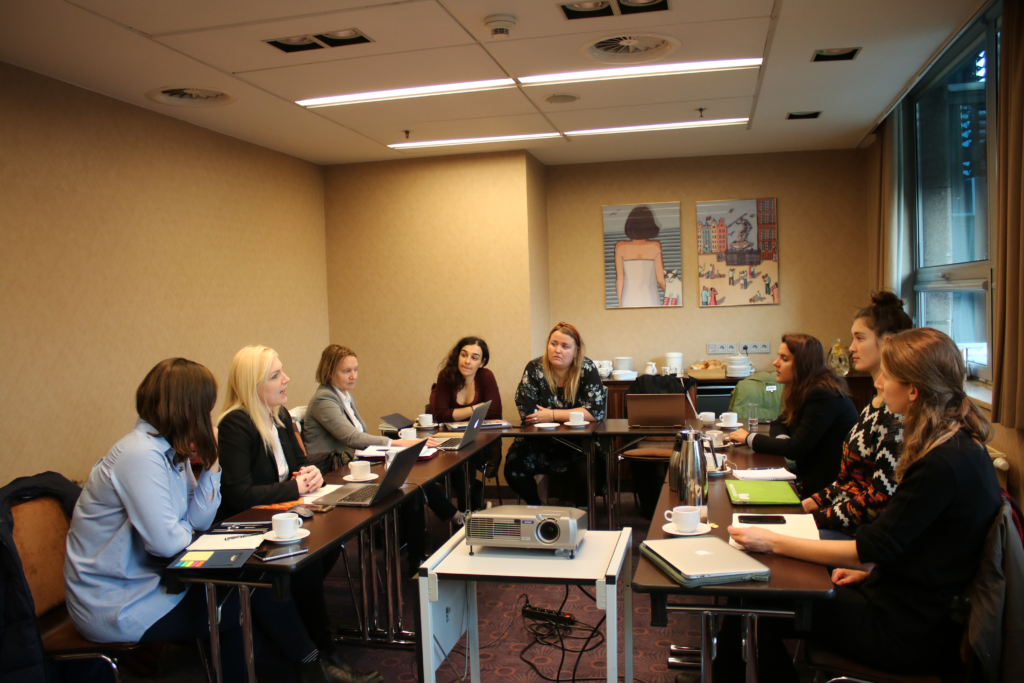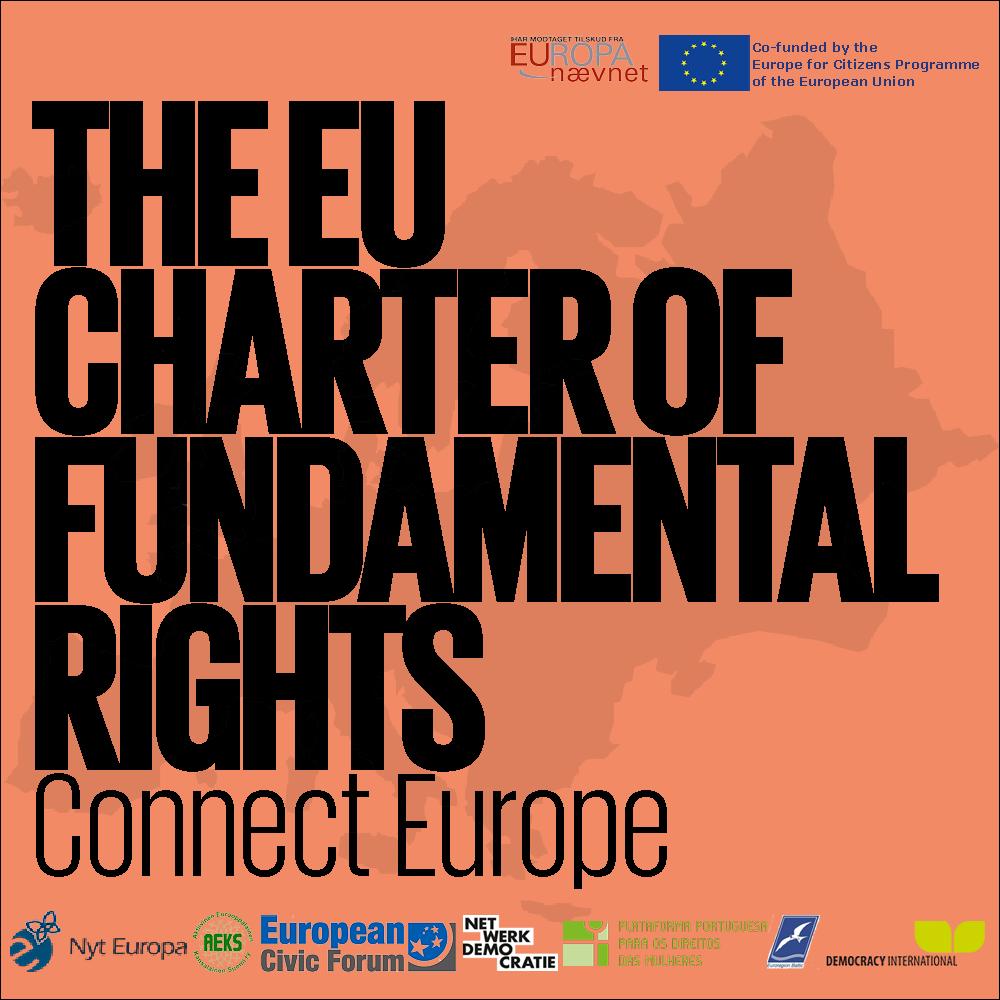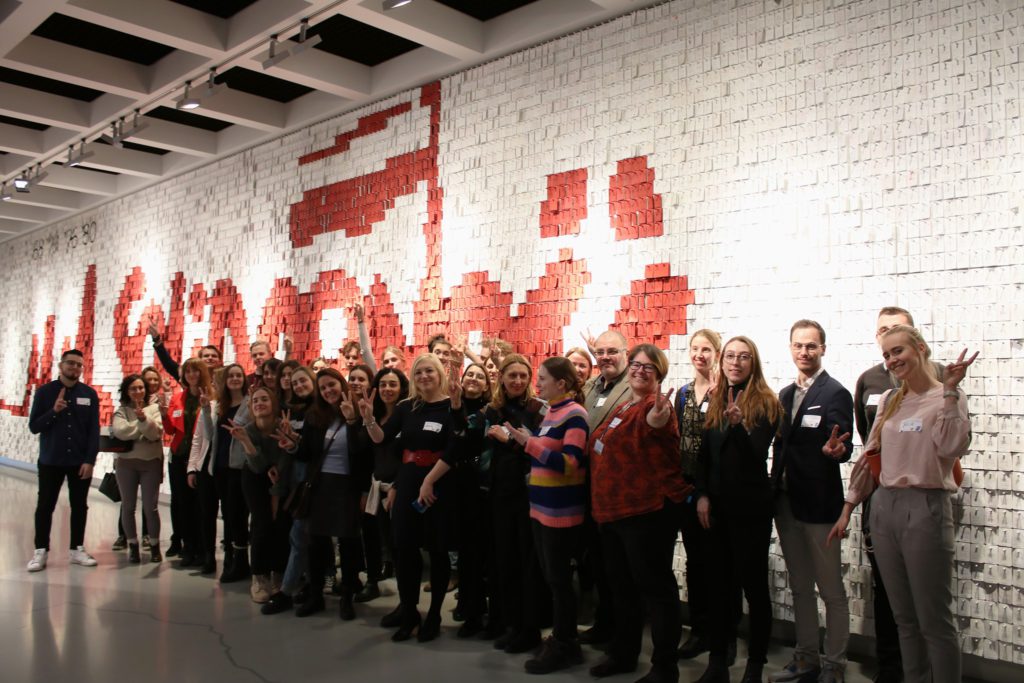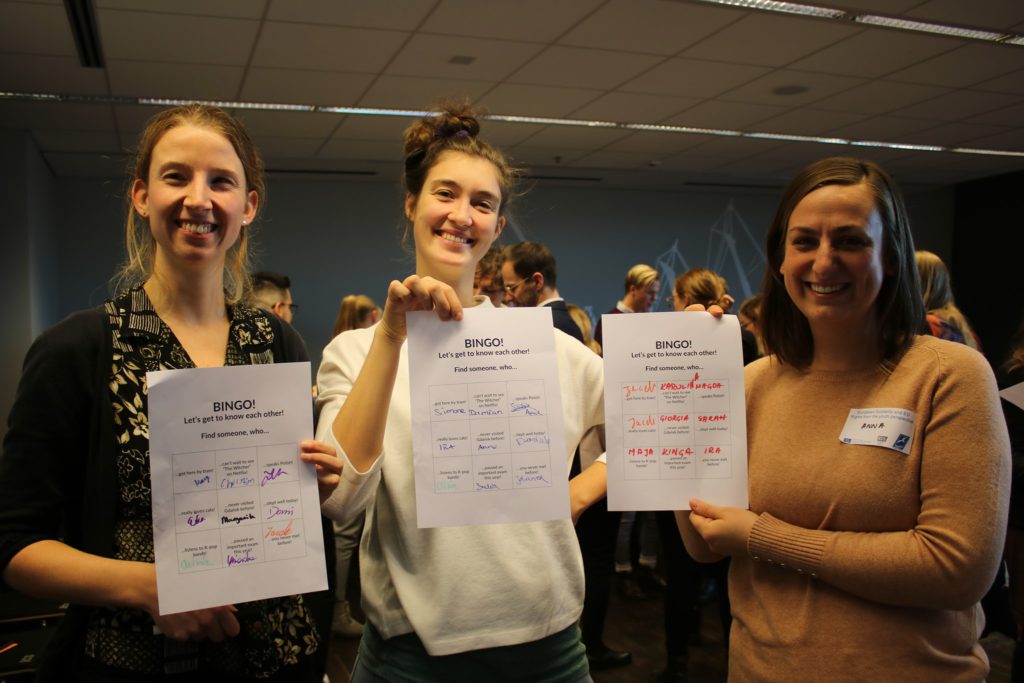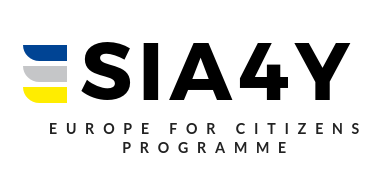| The project Strengthening civil society rights by information access for European youth” SIA4Y was funded with the support of the European Union under the Programme “Europe for Citizens” |

8 events have been carried out within this project:
Event 1
Participation: The event involved 31 citizens, including 23 participants from the city of Gdańsk and Elbląg (Poland), 2 participants from Helsinki, Finland, 2 participants from Brussels and Leuven, Belgium, 1 participant from Riga, Latvia, 2 participants from Tallin, Estonia and 1 participant from Verona, Italy.
Location / Dates: The event took place in Gdańsk, Poland from 10/12/2018 to 11/12/2018
Short description: The aim of the event was to have an internal, kick-off meeting for the Project Partners to discuss the contents of the project applications, planned project activities and upcoming project events. Partners shared our views and opinions on the best practices collected in previous projects and agreed for the most exciting formats we wish to offer to our youth. On the 2nd day, Lead Partner prepared a European Debate with the representatives of the project partners and from the Pomorskie region NGOs dealing with the civic engagement, youth issues and democracy.
Event 2
Participation: The event involved 93 citizens, including 66 participants from the cities of Elbląg, Dzieżgoń, Iława, Gdynia and Gdańsk (Poland), 1 participant from Greece, 1 participant from Verona, Italy, 2 participants from Hasselholm, Sweden, 18 participants from Klaipeda and Telsai, Lithuania and additionally – as a guest of our hosts – Euroregion Baltic – 5 participants from Russia, Kaliningrad Region.
Location / Dates: The event took place in Elbląg, Poland on 07/03.2019
Short description: The event was divided into two main workshop sessions, whose main scope was to bring the topic of “right of information access” in the foreground, also trough a synergy between SIA4Y and other youth-related projects known to the participants. etc. After the introduction to the project and Freedom of Information and Rights for the youth to access the information we had the first session was on “Responsible relationships and youth civic engagement”. The 2nd one was led by the representatives of the Transparency International Lithuania – ““Model Your Municipality: Participatory Budgeting Session”. Participants were asked to think of and create the budget for a common project that would benefit their municipalities. Afterwards, each group presented the idea they came up with and finally the audience had the chance to vote for the idea they considered most interesting and likely to be implemented.
Event 3
Participation: The event involved 25 citizens, including 22 participants from the city of Tallinn and Tartu (Estonia), 2 participants from Gdańsk, Poland and 1 participant from Riga, Latvia.
Location / Dates: The event took place in Tallin (Estonia) on 12/04.2019.
Short description: The aim of the event was to learn about information access and gender budgeting. The event “Who wins from budgets?” was part of the project “Strengthening civil society rights by information access for European youth”. SIA4Y organisers tried to break the notion of typical political and civic engagement by asking whether the participants can name one actively or passively made political act from that morning. That discussion helped to create a feeling that it even small steps have an impact and that it is relatively fun and easy to be engaged in society. The principles and tools of information access, it was time to listen to young decision-makers. A representative of the youth in Tartu city council talked about what motivates her as a young person to be actively involved. She also introduced her job and explained a civic involvement mechanism, participatory budgeting, that is being used in Tartu. This event was also promoting the active engagement in the upcoming EU elections in May 2019 – this was in line with our website and social media campaign encouraging youth to vote in the EU elections.
Event 4
Participation: The event involved 51 citizens, including 49 participants from the city of Riga (Latvia) and 2 participants from Gdańsk, Poland.
Location / Dates: The event took place in Riga (Latvia) on 25/04/2019.
Short description: The aim of the event was to learn more about the access and freedom of information. During the first part of the day youngsters learned about various aspects of Freedom of Information – What is information? Why do we need to access it? Who can request information from public institutions? – those were among the questions that were answered during the theoretical part of the event. Participants engaged in discussions and gave their opinions, therefore making the lecture active and lively. After learning about some of the tools for presenting and disseminating informative materials in an attractive and interactive way, youngsters split into groups and worked on their own informative presentations.
Event 5
Participation: The event involved 34 citizens, including 34 participants from the city of Helsinki (Finland).
Location / Dates: The event took place in Helsinki (Finland) on 21/10/2019
Short description: The aim of the event was to increase the level of awareness, knowledge and ability to use the right of access to public information and support freedom of information among youth. The event also aimed to increase the level of understanding and activity of young citizens regarding public monitoring of EU – level, state institutions and local government. During the event best practice on One-Stop Guidance Centers from Finland was shared and discussed with youth.
Event 6
Participation: The event involved 26 citizens, including 19 participants from the city of Leuven and Brussels (Belgium), 3 participants from Gdańsk and Elbląg (Poland), 1 participant from Riga (Latvia), 1 participant from Tallinn (Estonia), 1 participant from Paris (France), 1 participant from Madrid (Spain).
Location / Dates: The event took place in Leuven (Belgium) on 27.09.2019.
Short description: The aim of the event was to discuss the citizen’s control on public auction with the concrete examples and best practices from various EU countries like Belgium, Spain, France, Poland, Latvia and Estonia. Participants met also with the Ombudsman from the Flemish Region, learned about the FoI state-of-the-art in France, and the experience of Transparencia.be.
Event 7
Participation: The event involved 39 citizens from 13 countries, including 23 participants from the city of Brussels, (Belgium), 4 participants from Gdansk (Poland), 1 participant from Madrid (Spain), 1 participant from Vienna (Austria), 1 participant from Lisbon (Portugal), 1 participant from Tallinn (Estonia), 1 participant from Italy, 2 participants from the Netherlands, 1 participant from Berlin (Germany), 1 participant from Helsinki (Finland), 1 participant from Paris (France), 1 participant from Bulgaria, 1 participant from the UK.
Location / Dates: The event took place in Brussels (Belgium) from 06/11/2019 to 07/11/2019
Short description: The aim of the event was to present the Code of Good practice based on the discussion and questionnaires made by youth during the 5 country events – the first outcome of the SIA4Y project to the international audience. Meeting also aimed at the promotion of freedom of expression in UNESCO, Transparency International, ECAS, EAAGE and other pan-European agencies. Topics of the discussion were related to the all-European FoI rights and practices.
Event 8
Participation: The event involved 67 citizens, including 49 participants from the city of Riga (Latvia), 4 participants from Elbląg and Gdańsk (Poland), 2 participants from Helsinki (Finland), 2 participants from Brussels (Belgium), 3 participants from Lithuania and 7 participants from Tallin (Estonia).
Location / Dates: The event took place in Riga (Latvia) on 15/01/2020.
Short description: The aim of the event was to discuss with youth form various EU countries the access to information for youth – using interactive tools for disseminating information. In the meeting there were workshops on: Right of access to information enforcement through the UN, Enhancing the right to access information in the EU through Integrity Watch, Rights and opportunities for young people to access public information in school, municipality, country and many other.
The final conference, planned as event no. 9, has to be cancelled due to the COVID19 pandemic outburst. But on the 28th April Project Partners successfully realized and promoted the 3 project deliverables – documents and recommendations:
- SIA4Y Code of Good Practice “Youth Access to Public Information”– where we share best practices on youth policy, FoI practices related to young people and share ideas on how to engage youth to become more aware and active EU citizens. Download here: http://civicyouth.eu/wp-content/uploads/2019/11/CodeOfGoodPracticeWWW.pdf
- Our final publication “Youth for a healthy democracy in the European Union” – over 100 pages filled with academic expertise on transparency and FoI in the EU, written in lively, attractive manner – your complete guide to all FoI and Access to Information in the EU
Download here: http://civicyouth.eu/wp-content/uploads/2020/04/SIA4Y-final-publication-Transparency- FoI-1.pdf
- Recommendations “Priority transparency needs from a youth perspective” – concise paper with clear guidelines for the policymakers based on our 8 meetings with almost 400 young EU citizens representing 14 nationalities of the EU. Download here: http://civicyouth.eu/wp-content/uploads/2020/05/Transparency-needs.pdf


